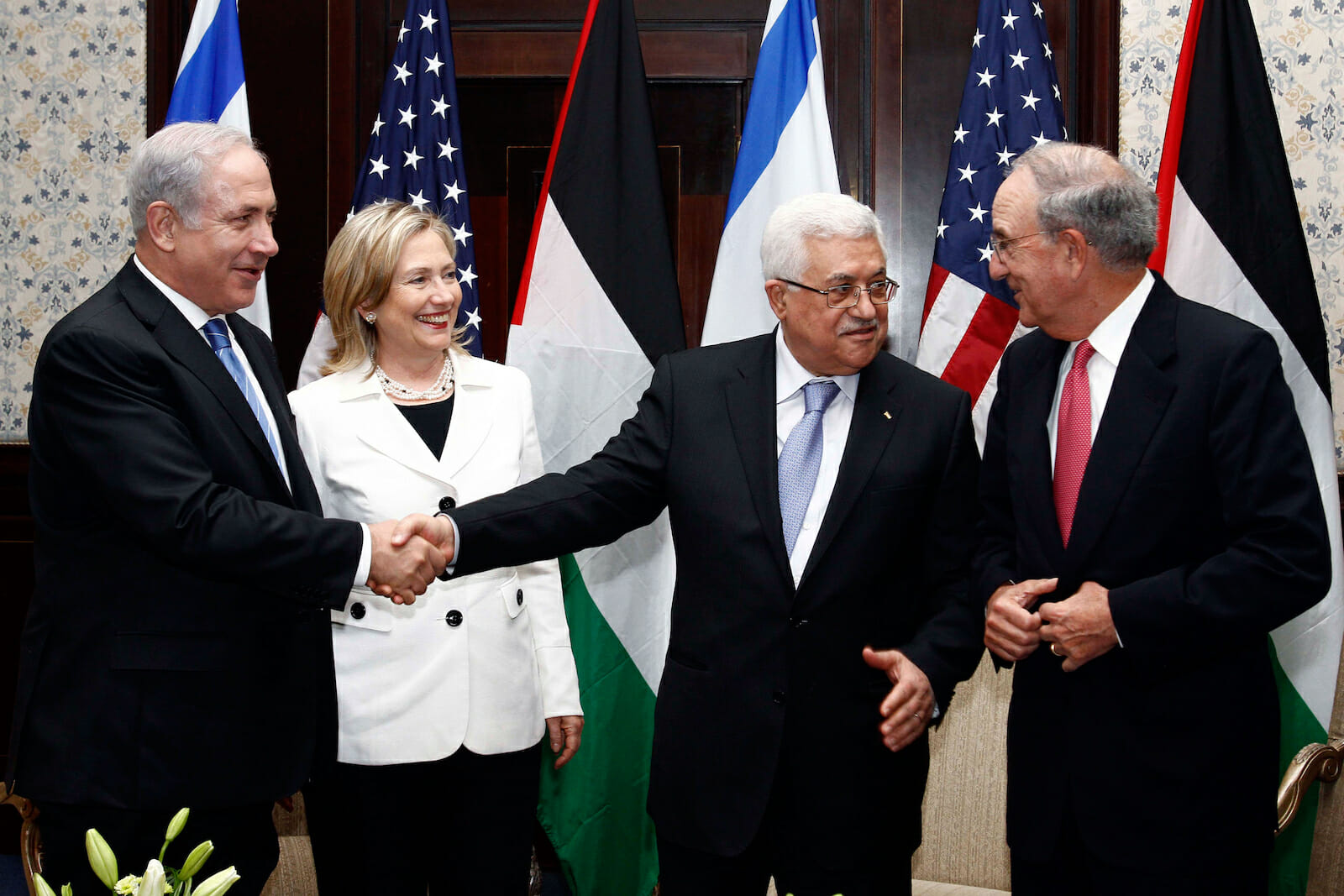
Three Short Stories about Israel and the Palestinian Authority
Perhaps the most perplexing element of the ongoing (and going and going…) Israeli and Palestinian conflict is that nearly every effort to bring resolution is met with the same stubborn fate of failure, despite changes in players, interests, contexts, and environments over the last 60 years.
As this latest attempt ends with more of a whimper than a bang, it is worth asking, was this conclusion forgone from the beginning? Is another outcome even possible? We suggest that the best way to answer this is to examine the three primary parties involved in the newly ended talks and we contend that the reason for the failure – and perhaps another year’s success – lies less with lines on a map and more with perceptions of strategic reality.
The Israeli Story
We can begin the discussion with Israel, a state increasingly internally divided about the role citizens should play in the future of the state. Right now, of course, Israel is led by Likud Prime Minister Bibi Netanyahu – a man who has traditionally favored a hawkish and conservative approach to the so-called peace process, and who has more recently been a vocal supporter of a two-state solution. However, Netanyahu is increasingly at the mercy of the ideologically opposed but strategically aligned Jewish Home and Yesh Atid parties whose continued support determines the sustainability of Netanyahu’s governing coalition. The Jewish Home and Yesh Atid fundamentally disagree about what role Israel should play in the peace talks.
The Yesh Atid party gained its 19 seats in parliament by focusing on how best to advance the prosperity of Israel into the future. Their platform focused on advances in education, technology, and the economy.
While their leader generally favors withdrawal from the settlements, it was not a huge or defining element of his 2013 campaign.
The Jewish Home party, a religious group, promotes building and populating settlements at an even higher rate than now. With the Yesh Atid party, they agreed to join Netanyahu’s coalition, because both believe that more important than the Palestinian question writ large is the question of the role of the Ultra-Orthodox Jews in the future state of Israel. Both groups have aggressively pushed to subject the Haredim to the military draft, to give the Israeli state a greater influence over what is taught in Haredi schools, and to subject the Haredim to taxes similar to those paid by the rest of the Israeli population.
All three of these issues are incredibly controversial and will have a huge impact on the future of the Israel state. If the parties fail to incorporate the Haredi into the modern state in these ways, the Israeli economy will be increasingly weakened as it endeavors to support a free-riding element of the population that has a significantly higher reproductive rate than any other sector. On the other hand, if Jewish Home and the Yesh Atid party do succeed in making the inclusion of the Haredi a legal requirement of citizenship, Israel may find itself facing a huge exodus of the Ultra-Orthodox from its territory. And given that the Haredi populate large portions of Jerusalem as well as settlements on the West Bank, their exodus has both security and religious ramifications for the state.
In the meantime, Netanyahu’s attention has remained focused on what he sees as an existential threat from an external source – the potential consequences of a nuclear Iran. Netanyahu reacted to the official failure of the peace talks with a lack of surprise or concern, preferring instead to continue his efforts to drum up anxiety over Iran’s latest machinations.
Where does this leave Israel? We suggest that Israel’s struggle to articulate its own narrative has hindered its ability to shape Palestine’s. Israel must decide whether the greatest threat in the structure of its society and economy is Iran or a displaced Palestinian people ready to use asymmetrical violence in an effort to regain territory.
The Palestinian Story
The Palestinians have struggled for years to develop a unity of purpose sufficient to gain real ground in peace talks with Israel. Of course, the most obvious interest is reflected in the existence of and contention between the religious-based Hamas party and the more secular Fatah party. When Hamas ventured into political participation in 2006, and then escalated into a violent overthrow of Fatah in 2007, the prospects for internal Palestinian unity looked dim. Under the leadership of Mahmoud Abbas, Fatah pursued international recognition as the legitimate leadership of the Palestinian people by renouncing violence against Israel and endeavoring (at least rhetorically) to negotiate a peaceful solution to the problem.
In contrast, Hamas – originally formed as the Palestinian branch of the Muslim Brotherhood – retained its “right” to challenge Israel’s occupation of Palestinian territories with force. From their tenuous perch in Gaza, Hamas has continued to leverage this position with consistent, if minor, attacks against Israel. Israel has retaliated twice with extraordinary force.
How then do we understand the recent announcement of reconciliation? Both sides have much to gain as well as much to lose from such an arrangement. Hamas stood to benefit from a Brotherhood-led government in Egypt and had endeavored to work with Morsi’s administration to open the Rafah border crossing on a permanent basis. Rafah serves as the only above-ground conduit to Gaza not controlled by Israeli forces and as such plays a huge role in Hamas’ ability to procure basic medical and food supplies for the people of Gaza. However, as Israel has repeatedly pointed out – it also stands to serve as an excellent conduit for weapons that Hamas can use against Israel.
In either case, Morsi’s fall from power and the subsequent crackdown against Islamists in Egypt does not bode well for the future of a Gaza-bound Hamas. Without an agreement with either the Egyptian government or Fatah, they are reliant on their extensive tunnel systems to secure both weapons and supplies. Israel has demonstrated the ability to detect and destroy large numbers of these tunnels already. Hamas had been receiving at least some funding from Iran – but when the Syrian conflict broke out, Hamas declared their support for the Brotherhood over the Iranian-supported Assad regime, and in so doing cut themselves off from yet another avenue of support.
All this is to say that Hamas stands to gain relief from the ever-tightening noose around Gaza if they unify with Fatah. Suddenly they could have access to the international funds that regularly support the Palestinian government, and Israel will be forced to loosen its restrictions on travel between Gaza and the West Bank.
However, Hamas stands to lose a lot as well. Fatah earned whatever international legitimacy it has by at least provisionally recognizing Israel, renouncing violence, and establishing several agreements about governance. If Hamas is unprepared to do the same, the Palestinian Authority could find itself without much of the international funding on which it so heavily relies. But if Hamas does accept this condition, it loses much of what makes it an attractive alternative to Fatah in the first place.
Fatah’s motivations are equally as complex. On the one hand, Fatah has made little progress in achieving anything through its non-violent approach to negotiating with Israel. Israel has continued to build settlements in the West Bank at an alarming rate, and every time they do, Fatah’s domestic legitimacy is called into question. For this reason, if Fatah can successfully form a unity government with Hamas they at least look as though they are not prepared to accept the status quo. Moreover, as long as Fatah is the only internationally recognized group representing the Palestinians, Israel has little incentive to change that status quo. In it, they are able to continue to expand settlements as needed and Fatah can do little about it. Hamas is (mostly) safely contained in Gaza and thus limited in its influence. If Fatah changes this equation by aligning with Hamas, it can potentially ratchet up Israel’s need to find a peaceful solution.
However, this too is a dangerous line to draw. As we have seen in the last few days, Israel will not accept such an arrangement quietly. It is possible that at least in the short term, Fatah will lose its international credibility entirely and Israel will be able to leverage Hamas’ classification as a terrorist organization to call into question any actions by a unity government.
Finally, the announcement of this unity government has not been followed by any practical details as yet. It is not clear what degree of representation Hamas will have in the new government, nor how funds will be split between Palestinians in the West Bank and Gaza. Moreover, no one has yet decided who will control security organizations in Gaza, or more importantly, who will answer for their failure. These issues are identical to those that led to the violent conflict between Hamas and Fatah in 2007, which indicates that Hamas and Fatah’s optimism, Israel’s consternation, and the international community anxiety, may yet be all for not.
If Hamas decides that its survival is sufficiently threatened by the strengthening of a secular military regime in Egypt, then it may consider the conditions of international recognition of unity a worthy price to pay. However, if they instead see the ideological foundations of their identity as more important, the unity government will either not last, or will take on the hard-line character that Hamas projects so well.
Fatah faces similar choices. If Abbas decides that Israel will never move forward on peace talks unless their existence is in question, he may decide that international sanctions are a small price to pay. On the other hand, if he chooses to value his own position as leader of the Palestinian people (ineffective or not) as the most important, he will likely shy away from the realities of unity, in which Hamas’ fiery rhetoric could eventually allow Hamas to supersede Fatah’s influence – not only in Gaza but in the West Bank as well.
The American Story
Since the very first announcement of the existence of a modern state of Israel, the US has embedded itself in the twists and turns of the resulting drama. The explanations for the motivation behind this continued interest vary from discussions of moral responsibility, realist strategy, and susceptibility to lobbying. In this most recent chapter of the crisis, perhaps the emphasis should be less on what motivates US action and more on what should.
The US has latched onto the idea of a two-state solution. It recognizes that it is the most plausible way to ensure the protection of all parties involved while also preserving a close alliance with Israel. What the US reaction to the Fatah/Hamas unity announcement shows is that the US has not yet recognized that any Palestinian state that comes out of this two-state solution will most likely not be made in the US’ image. If the US is serious about procuring peace, it has to become serious about preparing for what will follow it.
In the “War on Terror” years, the US was caught up in the notion that the world could be cleanly divided between state and non-state actors. States carried with them the ability to hold the monopoly over the legitimate use of force, and non-states did not. In those cases where these clean lines got a bit dirty – think Hezbollah in Lebanon and Hamas in 2006 – the US has responded by declaring the resulting governments illegitimate and withdrawing funds and/or recognition.
It is not clear that this approach has been any more effective at undermining the popularity of these groups than a 54-year trade embargo has been at bringing regime change in Cuba. It has, however, been quite effective in ensuring that the US has no influence in the way that these groups interact with the societies they seek to govern. In other words, the US gives up the ability to shape and influence in favor of retaining a symbol of ideological superiority. This begs the question of whether it is time for a new approach.
If we have learned nothing else since the fall of the Soviet Union, it is that lines between state actors, non-state actors, and the societies which give both influence are far less distinct than we may wish. Hezbollah has proven that non-state actors may lack the monopoly over the legitimate use of force, but they do not lack the willingness to outspend the state at a rate of 13:1 towards recovery in the aftermath of its use (Case Study Iraq). Fatah has illustrated that the renunciation of force may indeed be the morally right choice, but it is not a panacea for subsequent cooperation and peace.
The choices available to the US in the peace process (or lack thereof) are dependent on what it seeks after the process concludes. If the US simply wants an end to fighting, we should follow the announcement of the unity government with a withdrawal of funding for the PA and encourage Israel to bunker down in the status quo. Hamas is running out of allies and resources in Gaza, and Fatah has few options to evoke change without them. However, if the US actually wants long-term peace, prosperity, and protection of rights for people on both sides of the conflict, then the announcement of the unity deal should be viewed as a potentially valuable opportunity. If Hamas can be persuaded to respect past agreements and renounce violence, the organization stands to be fundamentally altered and deserves to be part of the resulting process. If this shift pressures Israel to be less comfortable with the status quo and energetically pursue a new alternative, so much the better.
Although the outcome of this latest round is no different than the many that preceded it, we consider the above stories a reason to support future efforts to try again. The peace talks have not fallen into the trap of insanity wherein the same thing is tried over and over with the anticipation of different results. Instead, each round seeks to leverage new developments in the stories of each of the players involved. While this latest round did not change the current reality between Israel and Palestine, the ongoing dynamics internal to each certainly will. The decisions that each makes over the next several months – about what defines citizenship in Israel, what defines opposition in Palestine, and what defines political cooperation for the US – stand to dramatically change the landscape for negotiations in the future. The most important ending relates to how these three stories will eventually intertwine – and that is an ending not yet written.
The views expressed in this article are those of the authors alone and do not represent the official policy or position of the National Defense University, the Department of Defense, or the U.S. Government.


